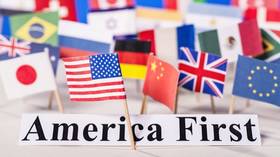EU-Asia partnership is a ‘crystal-clear message’ to Biden to end US protectionism in trade – Prof. Wolff

After six years of negotiating, the European Union and the Association of Southeast Asian Nations (ASEAN), a group consisting of 10 Asian countries, have upgraded their relationship to a “strategic partnership.”
The members of the ASEAN bloc joined China, Japan, South Korea, Australia, and New Zealand in the Regional Comprehensive Economic Partnership (RCEP) – an agreement to establish the world’s largest free-trade zone. The pact is projected to gradually reduce and, in some cases, eliminate trade tariffs on goods, including commodities. The combined gross domestic product of the countries that are part of the agreement is estimated to be around $26.2 trillion, or about 30 percent of global GDP.
Also on rt.com US left out as Asia Pacific nations strike world’s biggest trade deal“As close economic partners, we will stand up for safe and open trade routes, and free and fair trade,” said German Foreign Minister Heiko Maas, following the historic announcement. The official stressed that the bloc and the ASEAN members represent more than a billion people and nearly 25 percent of global economic power.
RT’s Boom Bust talked to Richard D. Wolff, Professor of Economics Emeritus at the University of Massachusetts, to explore the significance of the EU-Asia partnership, the potential for global trade in the current climate, and the probable steps the next US administration will take toward or away from globalization in trade.
“I think the message to the incoming Biden administration is crystal-clear,” the host of Economic Update and the author of ‘The Sickness is the System’ said.
Also on rt.com Biden says he will keep Trump’s tariffs on China for a while“Let’s keep in mind it was Mr. Trump and his administration that turned away from globalization, from international agreements, and to a nationalist strategy,” Wolf said, referring to the US’s trade war with China and the tariffs imposed on goods from Africa, Asia, and Latin America – both initiated and escalated by President Trump.
According to the economist, European and Asian countries now want to see if the incoming US government sticks with the current policy or undoes what Trump did in a demonstrative way.
“The ball is in the court of the Biden administration to show the world whether Trump was an aberration or whether they are going down that road also,” the professor said.
Biden recently said he was not going to make any immediate moves towards lifting the tariffs imposed on China by the previous government. Professor Wolff said that, as an economist, he was mystified by the upcoming administration’s lack of impetus.
Also on rt.com World’s largest trade pact led by China could crush US gas exports“I’m afraid that this symbol of not-changing, of staying with it, is an attempt to signal that at least some of the Trump nationalism is something that the Democrats either don’t want to break away from or are afraid to show themselves different from,” he said.
“And, in that case, you are going to see more and more strategic partnerships between everybody else in the world, and the US frozen out because it took that first step to break it.”
For more stories on economy & finance visit RT's business section














